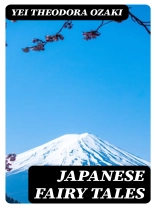In ‘Japanese Fairy Tales, ‘ Yei Theodora Ozaki presents a captivating collection of traditional Japanese folklore, artfully weaving together narratives that highlight the unique cultural tapestry of Japan. Her literary style combines lyrical prose with a deep reverence for the original tales, often incorporating elements of fantasy and moral lessons inherent in the stories. The collection includes well-known motifs such as the adventures of magical creatures, the trials of humble heroes, and the profound connections between humans and nature, all of which serve to illustrate the rich thematic undercurrents of Japanese culture and spirituality. Yei Theodora Ozaki, a pioneering figure in bringing Japanese literature to the Western audience, was deeply influenced by her bicultural upbringing and her extensive knowledge of both English and Japanese folklore. Accustomed to traversing the boundaries between cultures, Ozaki’s passion for storytelling is evident in her deft translations and adaptations, which preserve the essence of the originals while making them accessible to a global readership. This endeavor reflects her broader mission to bridge cultural gaps and illuminate the beauty of Japanese tradition. This collection is essential for anyone interested in folklore, cultural studies, or the enchanting world of fairy tales. Ozaki’s ‘Japanese Fairy Tales’ not only entertains but also serves as a portal into the soul of Japan, enriching readers’ understanding of its age-old wisdom and diverse mythology. Delve into this mesmerizing collection and experience the timeless allure of Japanese storytelling.
Over de auteur
Yei Theodora Ozaki (1871-1932) was a gifted translator of Japanese fairy tales into English. Born to a Japanese father and a British mother, Ozaki was raised in Japan and sent to Europe for further education, thus becoming fluent in both Japanese and English. This bicultural heritage, combined with her literary skills, uniquely positioned Ozaki to bridge the cultural divide between Japan and the Western world through her work. ‘Japanese Fairy Tales’, a seminal collection translated by Ozaki, served as a conduit for Western audiences to explore the rich tapestry of Japanese folklore and mythology. Her adaptations often sought to balance the preservation of traditional Japanese storytelling with the accessibility needed for an English-speaking audience. Ozaki’s retellings, while sometimes critiqued for their Westernized approach, remain celebrated for their role in popularizing the genre outside Japan. Through her work, Ozaki not only educated readers on Japanese culture but also contributed to the broadening of the global literary landscape. Her literary style is characterized by an engaging narrative voice, which has ensured that her translations continue to enchant readers and are cherished as classics in the folk literature canon.












